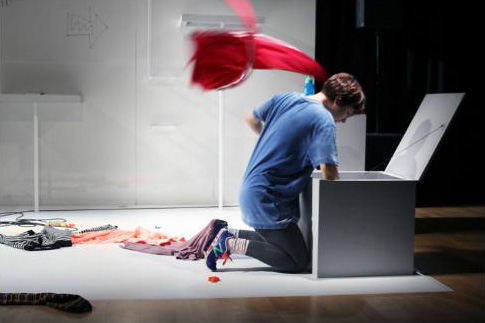Sybil Berg’s one-woman play (in a translation by Ben Knight), performed by Jennifer Jackson, is a passionate fulmination against modernity in a digital age. It is a short history of bad and disappointing sex – made possible by the likes of Tinder – of empty lives and half-baked relationships negotiated online. The usual suspects come in for a bashing including the superficiality of anyone concerned with their appearance, here given the inaudible telephone form of her half-sister. But like all such diatribes against the mix of spoon sized current affairs and trivia offered up by sites such as Buzzfeed and which fill the lives of so many, it stops short of offering any way out, any alternative.
The analysis is sharp and of the moment, delivered by a damaged young woman who relies on ‘chemical support’. ‘I sometimes wonder if my lack of empathy is something I should worry about.’ she says, but the internal analysis goes no further. It is not about an individual, it’s about us all or at least the society we are creating. In particular it is a youth unfriendly society; ‘I can’t wait to get old sometimes’, she says, as if some kind of release from the dissatisfaction with the present awaits in maturity.
Humour finds its way into the script: for example when the landline telephone rings she knows its her mother – for as we all know, only parents and nuisance calls don’t use our mobile numbers. The directing and performance are literally ‘off the wall’. Sarah Beaton’s clinical, shiny white set provides shelves and handles on the back wall onto which Miss Jackson leaps with all the sure footedness of a mountain goat. Standing or crouching she talks directly to the audience via the conceit of making a video. The actress is the perfect conduit for the author’s grievances, giving one of the most continuously energetic performances I can recall. There is no hiding place in this play, no place to relax; it’s full-on all the way through. Jennifer Jackson is a ball of energy, tumbling around like an eight year old, bringing life to an arid landscape, which if it weren’t for the sharp edges, could be a psychiatric cell.
And yet for all the genuine anger at the way things are, the artist’s vision is cut off where it might begin – with the possibilities of something better. If the ‘baby boomers’ got it wrong what’s the answer? ‘Tomorrow the World’ is not a call to action, but the leap in the dark which brings the show to its end. ★★★☆☆ Graham Wyles 3rd November 2015


